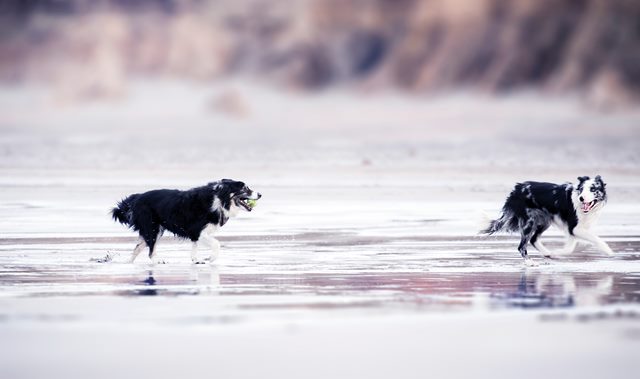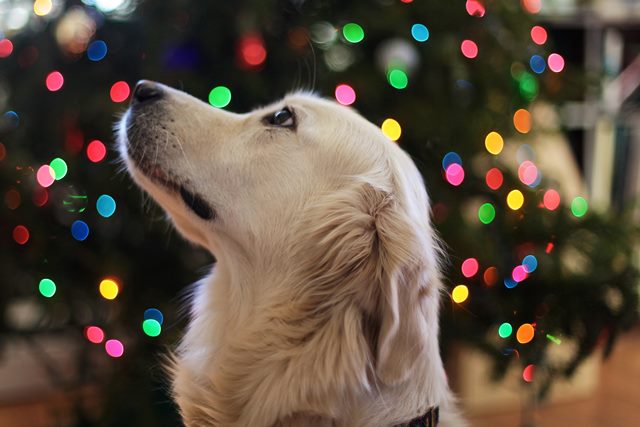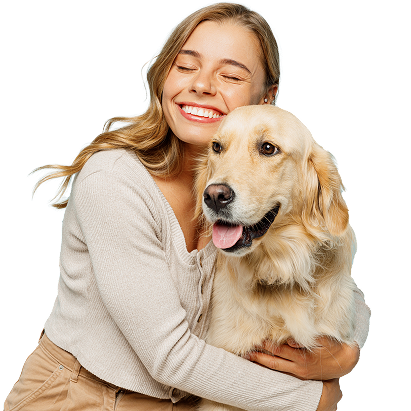Looking after your dog in winter
While many dogs will be keen to go out on their walks whatever the weather, there are a few extra things we need to consider in winter in order to keep our canine companions happy and healthy. Stay visible when walking Dogs still need regular walks even when the nights close in, and we have […]
While many dogs will be keen to go out on their walks whatever the weather, there are a few extra things we need to consider in winter in order to keep our canine companions happy and healthy.
Stay visible when walking
Dogs still need regular walks even when the nights close in, and we have fewer hours of daylight. Preferably take your dog out while it is light; however, if this is not possible, there are many lights and reflective accessories for collars, coats and leads now available to increase their visibility at night. Be sensible about where you walk – use pathways with streetlights, walk with other people, tell someone where you are going and even consider taking a torch.
Check their paws
Snow and grit can clump together between their pads and causes irritations and skin sores. Make sure you check their feet when you get home from your walk. If the road has been gritted or salted, then give them a little wash and towel dry.
Consider a coat
Dogs with naturally short fur, such as staffies and whippets, and dogs which have had their fur clipped short can really feel the cold. It is sensible to get them a coat to keep them warm and ensure they are still able to enjoy their walks.
Dry your dog
Walking in winter showers not only leaves you feeling a bit soggy! If you have been on a dog walk in the rain, or your dog has been for a swim, make sure you dry them off when you get home.
Place their bed somewhere warm
Like us on cold winters days, dogs, especially our older companions, often love to tuck themselves into bed. Place their bed away from draughts and consider giving them options near heat sources, such radiators (but ensure they are not so hot that they will get burnt).

Beware of stronger currents in rivers or the sea
If your dog is a keen swimmer, be wary that increased rainfall may result in river water moving faster than normal. Be cautious as to where you allow them to swim.
Frozen water
If water sources are frozen over, it is sensible to keep your dog on a lead so that there is no risk of them falling through the ice. If standing water is frozen over, then it is wise to take some drinking water and a bowl, so that you can offer your dog a drink at regular intervals.
Fireworks and Thunder
Make a note of any large local firework displays over the festive season. Avoid taking your dog out while these are going on. Stay home to ensure they are not upset by the fireworks.
Create somewhere cosy and covered for them to escape to should they feel scared. They may use this if there is thunder and lightning, local fireworks, or simply if the house if full of visitors and they don’t want to be sociable.
Keep your furry friends away from all the festive food
Many of our Christmas indulgences contain ingredients which can be toxic to dogs. Ensure your dog does not get access to grapes, raisins, nuts, chocolate, onions or garlic. Keep left-overs well out of the way, so there are no temptations for your dog. Chocolate tree decorations are best avoided if you have a greedy dog. Even if your dog is not normally a scavenger it is advisable not to leave them unsupervised with human food accessible.
Be cautious giving rich food as treats
A small amount of turkey or ham may be fine as a treat, but don’t overdo it. Sudden, large amounts of rich food can cause digestive upsets which are not pleasant for you or your dog.
Cut back food if less active
Whilst we would recommend walking your dog whatever the weather, some dogs are much less keen to exercise in winter than others. If your dog is reluctant to exercise as much as normal in the colder weather, make sure you cut back their food in line with their reduced activity to avoid them piling on the pounds! You can also play games inside to help keep them active.

Tidy away decorations
Dogs can eat silly things if left lying around. Tidy away your Christmas decorations to avoid them being eaten. Long decorations such as tinsel and ribbons can wreak havoc in the guts if eaten, and baubles etc. may cause obstructions.
Keep them moving
It is well known that arthritis can be exacerbated by cold weather. If you notice your dog becoming stiffer this winter, it would be sensible to make a trip to the vets. They may need some support in the form of joint supplements or perhaps a stronger pain relief.
Don’t forget the fleas!
Don’t be fooled that in winter it’s ok to stop preventative treatments such as flea control. While temperatures outside drop as we go into winter, our heated homes make the ideal breeding ground for fleas. Keep on top of regular house and pet flea prevention as advised by your vet.
Avoid using Anti-freeze
Ethylene glycol, present in anti-freeze, is extremely toxic to animals. Anti-freeze can be found in screen-wash, defrosting sprays and some garden water feature additives. It is known to have a sweet taste, which dogs may lick at if it finds its way into puddles etc. Even at small doses ingestion can be fatal. It is best not to use these products at all around your pets. However, if their use is deemed essential (e.g. screen wash) then take extra care when filling up to avoid spillages.
Seek veterinary attention immediately if you suspect your cat may have come into contact with anti-freeze.
Ensure their microchip is up to date
Walks in the dark may increase the chance of your dog getting lost. Whilst we all hope it won’t be required, it is a good idea to get their microchip checked as we go into winter, to ensure you would be able to be reunited should they end up getting lost.
Do you have a cat? Discover our Winter Cat Care guide to find out how your feline friend can have an enjoyable winter!
 Pet Owner
Pet Owner 



